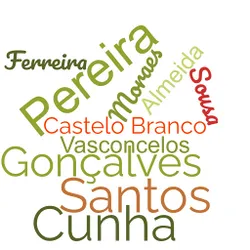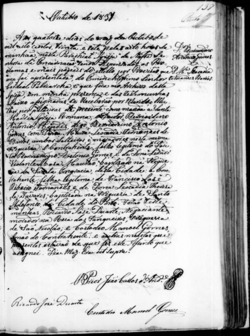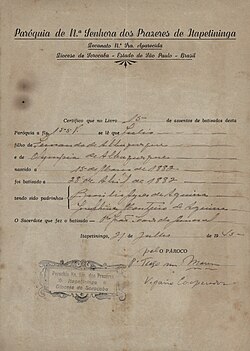
Portuguese surnames are family names originating in Portugal, located in the Western coast of the Iberian peninsula, the Azores and Madeira archipelagos, the former colonial possessions of Brazil, Angola, Mozambique, Cape Verde, Timor-Leste, Guinea-Bissau, São Tomé and Príncipe, former Portuguese India (today the Indian state of Goa) and the Special Administrative Region of Macau in China, as well as the Portuguese diaspora in America, Europe and South Africa. Like many other cultures in the region, Portuguese typically take two surnames, one from their paternal and one from their maternal sides.
History of Portuguese surnamesHistory of Portuguese surnames
Before Romans entered the territory of present-day Portugal, the native people identified themselves by a single name, or that name followed by a patronym. The names used back then, of Celtic, Lusitanian or Iberian origin, were clearly ethnic and some typical of a tribe or region. As the Roman conquest of Portugal strengthened, after the end of the first century AD, the adoption of a Roman-style name became the norm, the tria nomina: praenomen (given name), nomen (gentile) and cognomen, the last of which were originally nicknames but over time became hereditary.[1] By the Middle Ages, most Portuguese had surnames, generally derived from patronyms, local geography, occupations, and character traits.
Portuguese naming conventionsPortuguese naming conventions

According to Portuguese law, a child needs to have at least one surname from one of the parents, with a maximum of four surnames. [2] Generally, maternal surnames precede paternal ones. For children born out of wedlock, only the mother's family names are used unless the father of the child acknowledges him/her legally. A child can also receive surnames from their parents' ancestors, even if those surnames are not part of the parents' surnames, as long as the parents prove those names were used by their ancestors.
Since the 1970s, in all Portuguese-speaking countries, a woman has had the option of changing her name after marriage if she wishes; it used to be mandatory.[3] In Portugal (since 1977) and in Brazil (since 2002) a husband can also adopt his wife's surname. When this happens, usually both spouses change their surname after marriage; for instance, Manoel Gomes Vasconcelos and Fátima Cunha Soares could become Manoel Gomes Cunha Vasconcelos and Fátima Cunha Soares Gomes or Manoel Gomes Vasconcelos Cunha and Fátima Cunha Soares Gomes.[4]
PrepositionsPrepositions
A very common aspect of Portuguese surnames are the prepositions da, das, do, dos and de, such as in Maria do Carmo, Manoel da Cunha, Luiz do Rosário, Rosa dos Santos, and Adriana de Sousa, for example, and which mean "from" or "of;" da, do, das and dos are contractions of the preposition de and a definite article (o, as, a), meaning "from the" or "of the." The existing convention in Portuguese language is that they need to be written in lower case. These conjunctives are part of a composite name; for example, "Santos" is different from "dos Santos," but both are ordered under 'S' in an alphabetical list. Therefore, one should not refer to André Duarte da Cunha as Mr. da Cunha but rather Mr. Cunha. The conjunction e (and) is also common, like "José Costa e Mota," and generally indicates a composite surname, as in José Costa-Mota.
Portuguese surnames of patronymic originPortuguese surnames of patronymic origin
Patronymics surnames are very common in Portugal and its former colonies and are the oldest form of surnames in Portugal, just like in the rest of the Iberian Peninsula. Common patronymic surnames are those such as:
- Pires - son of Pedro
- Martins - son of Martim (Martin)
- Henriques - son of Henrique (Henry)
- Álvares - son of Álvaro
- Rodrigues - son of Rodrigo
- Nunes - son of Nuno
- Lopes - son of Lope
- Mendes - son of Mendo
- Gonçalves - son of Gonçalo
- Ruiz - son of Rui
- Fernandes - son of Fernando
- Muniz - son of Munio
- Esteves - son of Estévão (Stepehen)
In these surnames, the endings -es, -ins and -iz mean (son of). However, the -es ending is not an exclusive indication of patronyms; some family names with -es- endings that are not patronymics, but toponymics are Chaves, Tavares and Cortês.
Matronymic surnames do not exist in Portuguese; this can be confusing as there are some surnames that appear to be matronymics, like Mariano and Catarino, but these are references to Catholic saints, based on the Catholic practice of giving a child the name of the saint of the day in which he or she was born.
Portuguese surnames of toponymic originPortuguese surnames of toponymic origin
The second most common Portuguese surnames are those associated with the geographical origin of a person, the description of that location, or names of trees, usually associated with people who lived near a plantation or perhaps owned it, like:
- Cabral (the field where goats graze)
- Costa (coast)
- Carvalho (oak tree)
- Teixeira (a forest of yew trees)
- Oliveira (olive tree)
- Pereira (pear tree)
- Arruda (rue)
- Barros – from regions with clay or mud (barro)
Some toponymic surnames can also be derived from a city or town; sometimes, these can be composed of two words. Some examples are:
- Almeida – from a town in northern Portugal
- Moura – from the town in Alentejo
- Évora – from Évora, Alentejo region
- Castelo Branco in Beira Baixa
- Rio Branco - interestingly enough, there's no river called "Branco" (White) in Portugal, but in Brazil
- Castro – from Latin castrum, meaning fort or castle
After the independence of Brazil, some upper-middle class families adopted surnames derived from Tupi (the lingua franca of the colony) and Guraní languages, as a tribute to their new Fatherland, like:
Thanks to reverse migration, it is possible to find these surnames in Portugal nowadays.
Portuguese surnames of noble originPortuguese surnames of noble origin
Generally, the Portuguese surnames of noble origin are tied to noble houses or have roots in feudal landholding families, and often include prefixes like de, da, do, dos.
- de Bragança – Royal House of Portugal
- de Noronha – Noble lineage with Castilian ties
- da Câmara – Noble family from Madeira
- de Lencastre – Lussified version of Lancaster, a cadet branch of the royal House of Plantagenet
- de Melo – Prominent noble family
- de Azevedo – Aristocratic family name
- de Alarcão – Castilian noble line de Alarcón) present in Portugal
- da Silveira – Old noble house
- de Meneses – One of the oldest Portuguese noble families
- Corte Real - a family original from Tavira, famous for its involvement in the Portuguese discoveries during the Age of Exploration.
Portuguese surnames of religious originPortuguese surnames of religious origin

Portuguese people are among the most religious people in Europe,[6] and adherence to religion was also passed to its colonies. One of the most famous Marian shrines, the Sanctuary of Fátima is in Portugal, and the second largest Catholic church in the world, the Basilica of Our Lady of Aparecida, is located in Brazil. During colonial times, there was no freedom of religion, which meant that all Portuguese were compulsorily bound to the Catholic faith and were bound to pay tithes to the church, which explains why surnames of religious origin are common in Portuguese. The reasons for these surnames vary from ancestors who converted to Catholicism and intended or needed to demonstrate their new faith, orphans raised in Catholic orphanages by priests and nuns and who received a surname related to the date when they were found or baptized, or even from religious given names from either the parents or the child's god-parents that were adopted as family names; unlike in Spanish-speaking countries, where Jesús is a common given name, in Portuguese-speaking countries de Jesus is used exclusively as a surname. Some of these surnames unique to Portuguese culture are:
- do Espírito Santo - "of the Holy Spirit"
- São João - "Saint John"
- Boa Morte - "Good Death", devotional phrase that refers to a death in suitable circumstances to bring the soul to eternal salvation"[7]
- do Rosário - "of the Rosary"
- dos Santos - "of the Saints"
- Ramos - "Branches" (of the Palms for Palms Sunday)
- Pascoal - "Paschal"
- Nazário - "from Nazareth"
- Patrocínio - "Sponsorship", being witness of a candidate's spiritual journey into the Catholic Church
- da Cruz - "of the Cross"
Portuguese surnames of descriptive originPortuguese surnames of descriptive origin
Portuguese surnames based on a specific characteristic of an ancestor are less common. They became surnames in the Middle Ages as surnames became mandatory, like:
Portuguese surnames of occupational originPortuguese surnames of occupational origin
The least common Portuguese surnames are those associated with occupations, like:
Portuguese surnames of foreign originPortuguese surnames of foreign origin
A significant number of foreigners came to live in Portugal or its colonies centuries ago; over time, their surnames denoted their origins, such as:
- Franco – “Frank” (French or Germanic origin)
- Almanzor – of Arabic origin (from al-Mansur)
- Lourenço – from Laurentius (Latin), common across Romance languages
- Leão – from Latin Leo, and also a Jewish surname
- Assis – from the Italian city of Assisi
- Beja – from Arabic Baja, and a North African surname
- Navarro – originally from Navarre (Spanish Basque origin)
- Abecassis – Sephardic Jewish surname
- Castelhano – “Castilian” (Spanish origin)
- Morais – possibly linked to Spanish Morales or Arabic Mura (“garden”)
Portuguese surnames of Flemish originPortuguese surnames of Flemish origin
A special category of these Portuguese surnames of foreign origin are those who descend from the approximately 2,000 immigrants from Flanders who settled in the Azores during the XV century; while these Flemish immigrants quickly adapted to Portuguese culture and integrated to the larger Azorean society, their legacy is noticeable throughout the archipelago. As time passed, their surnames started to be written using Portuguese orthography, like:
Most common Portuguese surnamesMost common Portuguese surnames
| Surname | Etymology | Bearers | |
|---|---|---|---|
| 1 | Silva | forest | 283,326 |
| 2 | Santos | saints | 222,145 |
| 3 | Ferreira | smith | 191,083 |
| 4 | Pereira | pear tree | 173,391 |
| 5 | Costa | coast | 154,689 |
| 6 | Oliveira | olive tree | 145,961 |
| 7 | Martins | son of Martim | 138,290 |
| 8 | Rodrigues | son of Rodrigo | 138,045 |
| 9 | Sousa | pebble | 130,534 |
| 10 | Fernandes | son of Fernando | 119,777 |
Celebrities with Portuguese surnamesCelebrities with Portuguese surnames
- Edson Arantes do Nascimento, better known as 'Pelé', Brazilian football player
- Nelly Furtado, Canadian singer and composer
- Cristiano Ronaldo dos Santos Aveiro, Portuguese football player
- António Manuel de Oliveira Guterres, current Secretary-General of the United Nations
- Cesária Évora, Cape Verdean singer known for singing morna, recipient of the 2004 Grammy Award for Best Contemporary World Music Album
- José Pereira Coutinho, Macanese politician and jurist, Secretary for Transport and Public Works of Macau
See moreSee more
Explore more about Portuguese surnamesExplore more about Portuguese surnames
- Last names on MyHeritage
- Historical records from Portugal on MyHeritage
- Historical records from Brazil on MyHeritage
- Brazilian Football Legends Discover Their Roots With MyHeritage DNA on the MyHeritage blog
- Obtaining Portuguese Citizenship for Brazilians on the MyHeritage blog
References
- ↑ Ramos Ferreira, Ana Paula. Trabalhos de Arqueologia 34 - Epigrafia funerária romana da Beira Interior: inovação ou continuidade?. Instituto Português de Arqueologia, 2004. ISBN 972-8662-17-3
- ↑ Composição do nome. Registo Civil, Instituto dos Registos e Notariado, Ministério da Justiça. August 03, 2022
- ↑ Souza, Ludmilla. Há 45 anos, brasileiras podem optar por manter nome de solteira. Agência Brasil. September 11, 2022. .
- ↑ Direito ao nome em caso de casamento. Diário da República
- ↑ Santos, Felipe. 7 de Setembro: a elite que 'tupinizou' o próprio nome pela Independência. BBC News Brasil. September 06, 2021
- ↑ How do European countries differ in religious commitment?. Pew Research Center. December 05, 2018
- ↑ Pina-Cabral, João; Martins, Hermínio. Studies in Portuguese Anthropology and Modern History. Repositório da Universidade de Lisboa
- ↑ What I learned when tracing my Portuguese family ancestry. Medium
- ↑ CLAEYS, André. "Vlamingen op de Azoren in de 15de eeuw"; pp. 2. Brugge 2007.

